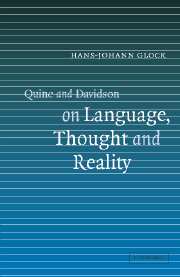Book contents
3 - Analyticity, apriority and necessity
Published online by Cambridge University Press: 22 September 2009
Summary
Statements like ‘g = 9.81 m/sec2’ or ‘Radioactivity causes cancer’ may be physically necessary. Their denial may be incompatible with the laws of nature, but it is not contradictory. By contrast, it seems that statements like ‘∼(p & ∼p)’, ‘2 + 2 = 4’ and ‘All material objects are located in space’ are necessary in a stronger sense. They must be true, no matter what the world and the laws of nature are like, since their denial is contradictory. By a similar token, our knowledge of such statements seems to be a priori. It is independent of experience, not as regards its origin (such knowledge is not innate), but as regards its validity: we can justify these statements without any reference to experience.
Radical empiricists reject these ideas. They claim that all truths are contingent and that all knowledge must be based on experience – even that of apparently a priori disciplines like logic, mathematics and metaphysics. According to Mill, the truths of mathematics are in effect well-supported inductive generalizations. As Frege pointed out (1953: §§7–10), this is dubious, since it makes the truths of pure mathematics depend on contingent physical facts. For this reason, the logical positivists settled for a moderate empiricism. Logic and mathematics, they conceded, are necessary and a priori; but they do not amount to knowledge about the world. For all a priori truths are analytic, that is, true solely in virtue of the meanings of their constituent words.
- Type
- Chapter
- Information
- Quine and Davidson on Language, Thought and Reality , pp. 71 - 101Publisher: Cambridge University PressPrint publication year: 2003



